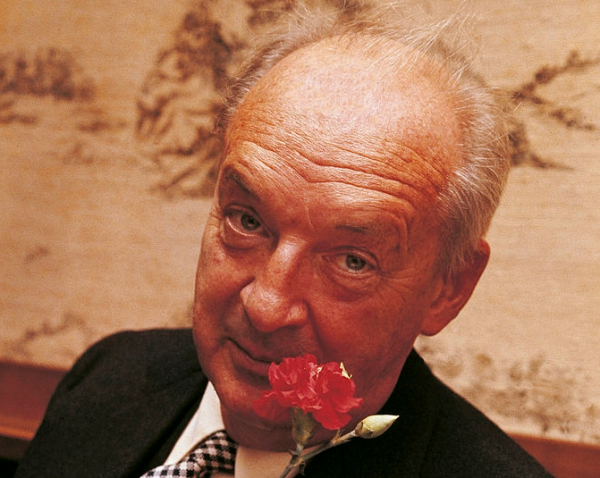
Image by Giuseppe Pino, via Wikimedia Commons
The writers who most stay with me are those who tend to write about reading: its pleasures, difficulties, and at times impossibility. Wallace Stevens, Franz Kafka, and Vladimir Nabokov belong in this category. Stevens’ essays in The Necessary Angel attempt to reconcile Plato and the Poets; reading for him is akin to a mystical union with ideas. For Kafka, reading is an act of ascetic self-harm: we should read only books that “wound and stab us… wake us up with a blow on the head… affect us like a disaster… grieve us deeply.” And for Nabokov reading can be a form of disciplined edification… and dissection. He wields his critical mind like a scalpel in his collected Lectures on Literature, in which we find a “little quiz” he devised for his students to test their thinking about what makes a “good reader.” One such quality, he suggests is the possession of an “artistic sense.”
Good readers, Nabokov suggests, should already have acquired this sense before they even approach a book. This doubtless leaves a great many people out, though he also implies in his criteria that learned qualities as well as innate ones play a role in the activity of reading, and that “artistic sense” can be learned. But Nabokov did not simply make a list—that would give it away too easily and we wouldn’t learn anything (about, perhaps, the qualities of bad readers). The professorial novelist never missed a chance to educate, and occasionally condescend to, his readers. In this case, he made a quiz with “ten definitions of a reader, and from these ten,” he had students choose the “four definitions that would combine to make a good reader.”
Take his good reader quiz, below, and see if you can quickly identify the other three qualities Nabokov requires. I doubt you’ll have much trouble. He provides his answers further down.
Select four answers to the question what should a reader be to be a good reader:
1. The reader should belong to a book club.
2. The reader should identify himself or herself with the hero or heroine.
3. The reader should concentrate on the social-economic angle.
4. The reader should prefer a story with action and dialogue to one with none.
5. The reader should have seen the book in a movie.
6. The reader should be a budding author.
7. The reader should have imagination.
8. The reader should have memory.
9. The reader should have a dictionary.
10. The reader should have some artistic sense.The students leaned heavily on emotional identification, action, and the social-economic or historical angle. Of course, as you have guessed, the good reader is one who has imagination, memory, a dictionary, and some artistic sense–which sense I propose to develop in myself and in others whenever I have the chance.
If you would like to sign up for Open Culture’s free email newsletter, please find it here. It’s a great way to see our new posts, all bundled in one email, each day.
If you would like to support the mission of Open Culture, consider making a donation to our site. It’s hard to rely 100% on ads, and your contributions will help us continue providing the best free cultural and educational materials to learners everywhere. You can contribute through PayPal, Patreon, and Venmo (@openculture). Thanks!
via Biblioklept
Related Content:
Vladimir Nabokov Names the Greatest (and Most Overrated) Novels of the 20th Century
Vladimir Nabokov’s Hand-Drawn Sketches of Mind-Bending Chess Problems
The Notecards on Which Vladimir Nabokov Wrote Lolita: A Look Inside the Author’s Creative Process
Josh Jones is a writer and musician based in Durham, NC. Follow him at @jdmagness


“Take his good reader quiz, below, and see if you can quickly identify the other three qualities Nabokov requires…of course, as you have guessed, the good reader is one who has imagination, memory, a dictionary, and some artistic sense.”
How many?
@MNMoxy
Only three, a possession of some artistic sense is already described in the previous paragraphs before the ‘quiz’. I expect that when he gave the test to his students he wouldn’t have already given them this answer.
–> One such quality, he suggests is the possession of an “artistic sense.”
11. The reader should have reading comprehension.
You shouldn’t have prepared us at the beginning. Should have jumped strait to the quiz and explained what the results say about the selections.
It dependes on whether you have a realistic approach or not For me,the reader shoulld concentrate on the “base structure”, the role of the imagination cannot be denied, unless it is carried on fantatic dimensions, Freud’s view on the identification with heroı or heroine is also valulable, every reader should find something of himself or herself .
The *other* three of the four, as the quality of artistic sense was implied in the second last paragraph before the list is revealed.
3. The reader should concentrate on the social-economic angle.
7. The reader should have imagination.
8. The reader should have memory.